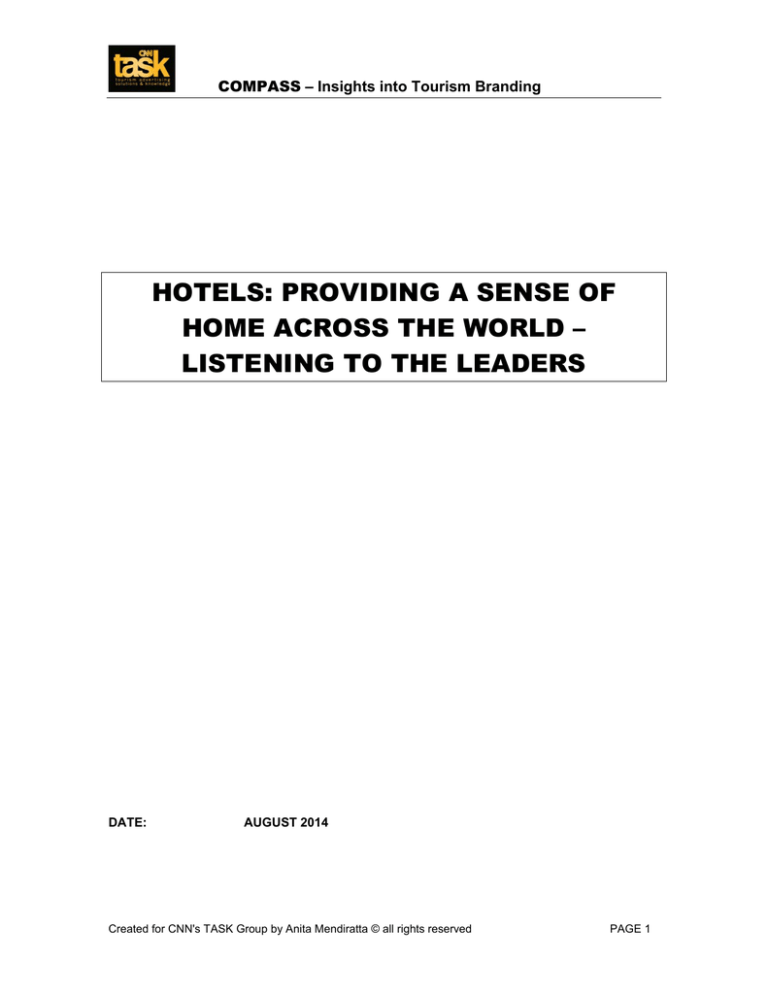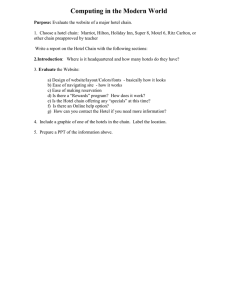
COMPASS – Insights into Tourism Branding
HOTELS: PROVIDING A SENSE OF
HOME ACROSS THE WORLD –
LISTENING TO THE LEADERS
DATE:
AUGUST 2014
Created for CNN's TASK Group by Anita Mendiratta © all rights reserved
PAGE 1
COMPASS – Insights into Tourism Branding
Radisson, Red Carnation, Ritz Carlton, Conrad, Hilton, Hyatt, Park Inn, Intercontinental. For
millions of travellers around the world, their names have become synonymous with second homes,
their rooms as familiar as second bedrooms, their presence a comforting sight when arriving into a
new (or not so new) city. Often they take the edge off of tired travel.
At the same time they energise. They relax, recharge, restore. They work to understand what you
need, and they work hard to get to know you personally. They seek to become an oasis where
guests can unwind, unworried about the details they demand to stay connected to their work, their
colleagues, their friends, themselves. All will be taken care of.
Without a doubt they are the backbone of the hospitality industry. And they are on the front line of
current challenges, and opportunities.
The hotel sector has, and will always be, a vital part of the total traveller experience. Whether
traditional global brands, local branded offerings, or increasingly active airbed (ie AirBnB) options,
the hotel sector represents an imperative of tourism industry growth, development and
appreciation.
In this month’s CNN TASK Compass article, we take a closer look at leading a global hotel brand in
today’s increasingly competitive and complex marketplace, learning from the leaders as they look
to new opportunities and new offerings required for new markets and new guests.
REMARKABLE REACH, OFTEN UNRECOGNISED
While omnipresent across the global travel landscape, the real value of the hotel sector so often
goes unrecognized. Consider this:
current estimate of number of hotels worldwide: 187,000 offering over 17.5 million guest
rooms
total revenues generated by the industry are set to exceed US$ 717 billion, with 2009-2014
enjoying a hard-earned annual growth rate of 5.3%
an estimated 4.2 million people are employed within the hotel sector this year
growth in hotel investment is a direct reflection of sustained confidence in the sector, 2014
seeing a 5-year high in deal volume
across the top 10 hotel groups alone, 2014 will see 1,120 more hotels versus prior year,
growth of 3%, leaning heavily towards brand roll-out in Asia
the active pipeline towards 2018 has over 7800 hotels in the works, adding over 1.3 million
rooms to the global mix, the critical mass being within the Upper Midscale to Upper
Upscale segments
Still, for all of the positive numbers and spirit, the hotel business is an intensely challenging one.
With software – service culture, brand experience delivery and loyalty generation amongst other
dimensions – as important as hardware – the bricks & mortar, décor, special features for enhanced
recreation or business productivity, and other tangible benefits across the hotel, keeping it fresh,
compelling and competitive is key.
But it is certainly not easy. Especially in these times when a whole new world of travellers is
opening up, both in terms of mindset and geographic spread.
But how do leaders actually decide where to go, grow, and innovate next? How does a hotel group
separate the increasingly distracting buzz from the real business potential.
Where in the world is the next wave of growth coming from? And what about the Millennials?
Created for CNN's TASK Group by Anita Mendiratta © all rights reserved
PAGE 2
COMPASS – Insights into Tourism Branding
Within the world’s Top 10 stands tall the Carlson Rezidor Group with its well-known and widely
respected Radisson, Park Inn and Quorvus Collection brands. At its helm, its inspired and inspiring
President and Chief Executive Officer, Wolfgang Neumann. His professional, prestigious presence
belies the scale of the pressures and challenges he faces, daily, in leading the group within the
global marketplace. Like other leaders of major hotel groups working tirelessly to master their
markets, past, present and future, Neumann’s focus is acutely focused on securely maintaining
presence, profile and profitability in existing territories of strength, while victoriously venturing out
into new terrain.
CHOICES, CHOICES AND CHALLENGES
As the global travel & tourism world continues to act as a force of global unlocking and unblocking
of understanding, appreciation and unification, with the East fuelling growth in the West at the
same time that the West excites in exploring East, establishing priorities for investment into
expansion is an overriding test of will and wisdom. Where? When? With what brand? And what
team?
As explained by Neumann:
“Every emerging market has its challenges – be it pipeline erosion and delays, high
development costs, bureaucracy or increasing local & regional competition. We try to
overcome such challenges with strong teams based in the respective country and with
deep local knowledge; thoughtful planning; and close cooperation with our owners and
business partners – personal, long-term and transparent relationships are crucial in many
emerging markets.”
Operational expertise is one thing. But what about the image, and promise of experience delivery?
Neumann continues:
“Looking at the different cultures in the markets we operate in, our brands are international
brands and bring as such a set of international standards with them which define them –
and which our guests expect and request. But there are of course local/regional influences:
The majority of our hotel team members are locals, architecture and design of the building
reflect local/regional influences, menus are inspired from local/regional flavours etc. The
right balance between the overriding international standards and the local added values
play an important role for the hotel’s success.”
A strong example of the Carlson Rezidor Group’s commitment to relevant, high-return market
investment is its focus on a region where others are potentially overlooking. As much as there is a
scramble for Asia, that region does not have exclusivity when it comes to long-term ROI.
Maintaining focus on the bigger picture vis a vis the company strategy and strengths is critical.
As explained by Neumann:
“One of the east’s biggest markets – Russia – is actually one of Carlson Rezidor’s core
markets for future business development. Our long-term strategy is an asset-light,
profitable and sustainable growth through fee-based contracts especially in the emerging
markets of Russia/CIS & Baltics and Africa and in selected key focus countries; namely
Russia, Nigeria, Turkey and Saudi Arabia.
Due to huge natural resources, constantly improving infrastructure, demographic changes
and last but not least an imbalance in supply and demand when it comes to internationally
branded hotel rooms, emerging markets like Russia (and Africa) offer a considerable
potential for growth which we pursue together with strong regional partners. Russia is also
among the ten largest economies in the world (by nominal GDP) and hosted/will host major
events like the Winter Olympics 2014 and the FIFA World Cup 2018 that push travel &
tourism.
Created for CNN's TASK Group by Anita Mendiratta © all rights reserved
PAGE 3
COMPASS – Insights into Tourism Branding
Carlson Rezidor was one of the international pioneers on the Russian hotel market and is
today the leading international hotel operator in Russia/CIS & Baltics (45+ hotels in
operation, 30+ hotels under development). We are committed to this region and are
currently focusing on our two core brands Radisson Blu (Europe’s largest upper upscale
brand) and Park Inn by Radisson (a fresh mid-scale offer) – but also evaluate opportunities
to introduce our new brands Quorvus Collection (luxury) and Radisson Red (lifestyle
select) to the area.”
BALANCING ROBUST GOALS WITH REALITY
Still, for all of the ambitious plans, the ultimate test of leadership is facing the storm with courage,
conviction, carefully calculated plans of action, and sometimes simply a very large umbrella. For
Neumann, the risks are as clear as the rewards. Neumann is open in his sharing of the challenges
of the current reality:
“Speaking about Russia/CIS, the current unrest between Russia and Ukraine * is certainly
a challenge which we monitor closely and with concern. We ensure alignment with all
current sanctions, and our priority is the safety & security of our guests and employees –
we are doing our utmost to run our hotels in the area as smoothly as possible and to
ensure the wellbeing of our people. We believe in Russia as an emerging market and are
committed to the region, so do hope the current challenges will be solved soon on a
diplomatic basis.”
The long-term remains the end-goal.
“More generally seen (and independent from the actual turmoil), every emerging market
has its challenges – be it pipeline erosion and delays, high development costs,
bureaucracy or increasing local & regional competition. We try to overcome such
challenges with strong teams based in the respective country and with deep local
knowledge; thoughtful planning; and close cooperation with our owners and business
partners – personal, long-term and transparent relationships are crucial in many emerging
markets like Russia.”
Whatever the region of prioritized growth, whatever the circumstance, enduring leaders of the hotel
sector demonstrate an unwavering commitment to what has always been their source of
inspiration. In the case of Carlson Rezidor, it is a simple, proven equation. As he quietly reflects,
Neumann shares:
“I am a hotelier at heart and truly appreciate the fact that our business is a people
business. We want to develop our talent, delight our guests and maximize financial returns
for our owners – it’s a “golden triangle” of people. I enjoy very much that we are not only
focusing on our business, but that we are hosts focusing on our teams, our guests and our
business partners.”
That, in the end, is the true bottom line, and the spark of enduring passion for this courageous
leader.
* In reference to the 2014 unrest between Russia and Ukraine at time of writing
- ENDS –
Created for CNN's TASK Group by Anita Mendiratta © all rights reserved
PAGE 4

